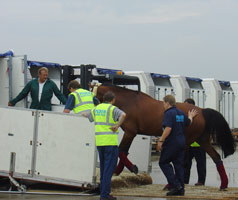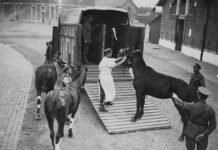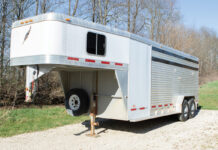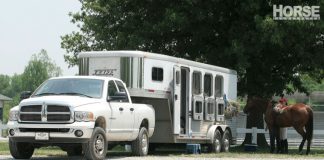 Traveling from oversees for the World Equestrian Games in Lexington, Kentucky, can be troublesome for people, but the equine athletes journey in more comfort than the human participants and spectators. While people face cramped seating, security check-ins, and lost luggage, horses travel in functional luxury with their belongings nearby. Best of all, horses do not have to endure the sometimes upsetting ordeal of scampering through the airport to catch a contacting flight because they remain housed in a portable stall throughout their travel.
Traveling from oversees for the World Equestrian Games in Lexington, Kentucky, can be troublesome for people, but the equine athletes journey in more comfort than the human participants and spectators. While people face cramped seating, security check-ins, and lost luggage, horses travel in functional luxury with their belongings nearby. Best of all, horses do not have to endure the sometimes upsetting ordeal of scampering through the airport to catch a contacting flight because they remain housed in a portable stall throughout their travel.
Peden Bloodstock, based in England, is WEG’s official equine shipping agent. The company will oversee the import and re-export of all of the approximately 800 international horses as well as competitors’ equipment including carriages. Peden also will have intensive role in quarantine and bio-security measures upon the horses’ arrival.
“We believe that our track record specializing in large and complex movements of horses to and from World Championships and Olympic Games speaks for itself, having been appointed shipping agents for all the WEG’s since their inception in 1990 and having also handled the last six Olympic Games,” said Peden’s Managing Director Martin Atock.
The company also was responsible for sending top competitors to the Rolex Kentucky Three-Day Event in Lexington in April. Their clients include Oliver Townend and William Fox-Pitt who endured a convoluted journey from Europe because of restricted travel in the aftermath of the Icelandic volcanic eruption. Their horses, however, left several days prior to those restrictions and had seamless trips.
Good to go
Katherine Mellor, Townend’s head traveling groom, also left early for Kentucky on a commercial flight after overseeing his horses’ departure. Her duties included packing the gear.
Like commercial airlines that have specific–and seemingly silly– requirements for carry-on items, horse flights have their own prerequisites.
“I pack all of the [horse’s] equipment into containers,” she said. “You have to name all the feed supplements and liquids. We have the rider’s name and the horse’s name and we have to list every single thing that is packed.”
Mellor readied the horses for the flight by placing duct tape on their shoes so they would not dislodge if stepped on and placed traveling boots with straps on their legs. Some horses travel with helmet-like head bumpers.
While humans are free to continue in their chosen direction after deplaning, horses must spend time in quarantine upon arrival in the United States. Those arriving for WEG must stay a minimum of 42 hours in temporary quarantine facilities constructed specifically for WEG at the Cincinnati/Northern Kentucky International Airport where they are monitored and tested for contagious diseases.
“The purpose of quarantine is to monitor the health of the horses and to ensure that they do not bring any unwanted diseases into the United States,” said Henry Bullen of Peden. “While the horses are in quarantine they are blood tested for four diseases–Dourine [a venereal disease], Equine Infectious Anemia [swamp fever], Glanders and Equine Piroplasmosis [EP]. The quarantine is overseen by the United States Department of Agriculture, Kentucky Department of Agriculture and WEG veterinarians.”
When Mellor came for Rolex, she journeyed via a commercial flight to Newark, New Jersey, about 75 miles from the Newburgh, New York, quarantine facility for the horses. A Peden transport manager took her to the Newburgh airport where she unloaded Townend’s horses and accompanied her to the quarantine station about 30 miles away.
“I was only allowed to unload them, and check them over and then hand them over,” she said. “And then I wasn’t allowed to see them again [for two days].”
Stress free
During their stay in quarantine, horses are cared for by a select number of National Federation attendants.
Peden has a number of highly qualified, professional horse attendants known as “Flying Grooms” or “Pro Grooms”. These dedicated stable hands are members of the Animal Air Transportation Association and are responsible for the care of the horses during the flight. Upon the owner’s request, they may accompany the horses to their final destination. In addition to their extensive horsemanship, they have in depth knowledge of aircraft and the constantly changing procedures at airports around the globe.
“The approximate ratio is one groom for every three horses,” Bullen said.
In some cases, customers have the option of sending one additional person of their choice to accompany the horse on the flight.
Just like humans, horses can become stressed from traveling. Although animals are free of mental worry such as making connections or missing their luggage, the journey can take a physical toll. Prevention is key to avoiding travel related illness.
Dehydration can be eliminated simply by ensuring horses have access to water either by free choice or offered periodically from a bucket during their journey.
Just as some people take over-the-counter cold supplements to avoid catching a cold or the flu before flying, horses can be treated by a veterinarian with products designed to stimulate the immune system and stabilize the digestive system to reduce the chances of colic, diarrhea, and ulcers.
Horses generally arrive at their final destination in peak form thanks to the vast experience of commercial equine carriers. Peden traces its roots back more than a century when the company moved cavalry mounts and race horses by train and paddle boats. Their initial air transport took place in 1947 when three horses were flown from France to England.
Liane Crossley is a Lexington, Kentucky-based freelance writer whose work appears frequently in Throughbred Times and the Keeneland Race Course program.





